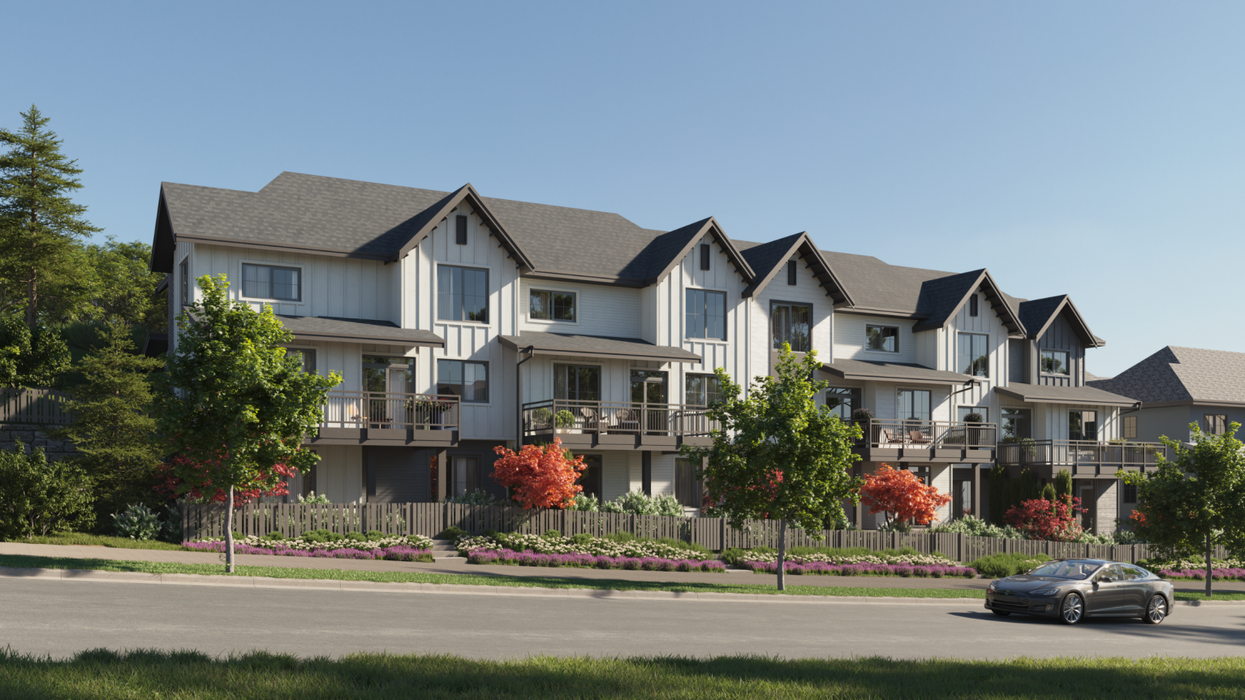No developer is immune to a downward market cycle, even Polygon Homes, who’s been around since 1980.
The region no longer has a supply shortage, but a lack of demand, said Polygon Homes President Neil Chrystal, who’s been with the company for 38 years.
“We don’t have a supply problem anymore... the problem now is there are no buyers,” he said.
“And even the ones waiting on the sidelines, they won’t fill up the amount of supply that we have.”
That’s why it was good news for Chrystal, and Polygon Chairman Michael Audain, to see a line up form at 5:45 am recently outside their Ridgewood sales centre for 32 Coquitlam townhomes. By the end of the weekend, they’d sold 30 townhomes, priced from $1.1 million to around $1.4 million. Buyers were a mix who appreciated the lower price point of a townhome compared to a detached house, which Polygon also builds, through its Morningstar Homes division.
“There’s been a lot of growth in Coquitlam, so we had a lot of people who were either in apartments and moving up or in smaller townhouses, looking for something larger, and I think we just priced it well,” said Chrystal.
“We have lots of homes and a lot of them are just sitting around. There are no buyers. And it might be that we are outside of their reach zone, where they want to stretch to buy something.
“You can wait it out and wait for something good to happen. Maybe it’s a drop in interest rates. Maybe it’s a pick-up in the market. But we take the view that if we have homes that are nearly finished, we prefer to sell them rather than own them. We priced them fairly, but not grossly under market. Just good value. Were we surprised to see people lining up that early? Absolutely. “We haven’t had that happen in a heck of a long time.”
READ MORE: CEO Neil Chrystal On Polygon Homes' 45th Birthday And The Current Development Landscape
Chrystal said there aren’t a lot of positives out there, and “we’re living in a sea of negativity that is being amplified by all the issues around tariffs” and politics. Buyers had been sidelined for the last 18 months, waiting for a confidence boost. Polygon is doing well compared to smaller, less capitalized companies, but it’s still tough.
“Developers, we work and operate on returns. Do we try to make money? By all means, we do that,” says Chrystal. “But in this case, I said, ‘we won’t make a lot of money going to market, but we will offer homes at a fair price.’ And we had a little niche where we had entry level homes for under $1.1 million and move up homes in the $1.3 to $1.4 [million] range... it represented good value.”
He said it was a nice burst of action in an otherwise dead market.
“I think what our market needs is positive news because there is no good news about real estate,” he says. “’Housing starts are falling, this developer is going broke, this site is in foreclosure,’” he said of the headlines. “We are living in a sea of negativity that is being amplified by all the issues around the tariffs, by politics at the provincial level, the federal level, the municipal level. Everyone is fighting over what to do around affordability and it’s unfortunate. I think, it’s my view, and maybe a more positive outlook, that for 18 months the buyers moved to the sidelines, and they are waiting for a sign.”

Government could do its part, he said. The stress test on qualifying for a mortgage for first-time buyers is a barrier. The proposed waiver of the GST on new homes, or perhaps a reduction in the provincial foreign buyer tax to stimulate investment in real estate would help. As for the interest rate, it’s settled in at around 4%, which is far lower than two years ago and, “historically, is an exceptional rate.”
He says buyers arrive through immigration or changes to household formation. A drop in interest rates can also encourage renters to become buyers.
Part of the problem, he said, is that investors have disappeared. To illustrate his point, Canadian Housing Statistics Program (CHSP) data show nearly half of all condos in Vancouver are investor owned. Today’s market is restricted by policy pressures such as the federal foreign buyer ban, the cap on international students, the previous tax threat on capital gains, and rules around short-term rental and empty homes taxes.
“Presales are an integral part of any tower moving forward, and two or three years ago any part of a presale campaign was the investors. Now we don’t make it friendly for investors to invest anymore,” said Chrystal.
In simple terms, prices fall when there’s an abundance of supply, which there is in the rental market in Vancouver. For presale condos, it’s not so simple.
There are 1,400 rental units expected to come on-line by the end of the year at the massive Senakw project by Burrard Street bridge (representing only the first three of 11 towers); rental highrises throughout the Broadway Plan; as well as the City’s own recently announced plan to develop their own rental buildings. As a result, rents are coming down.
Polygon is a merchant developer, so they don’t hold rental properties.
“The rental market is certainly unfolding in the classic, ‘if you over-build, the rents will come down.’ And landlords are reluctant to lower their rent. They’d sooner offer a lot of incentives,” he said.
“In the condo world, it’s different. We are more cautious.
“What we choose to do, if we don’t think there’s a market at the price we need, we just don’t build. Every city can say, ‘we are approving all these projects,’ but if it isn’t economically viable, nobody is going to build them. What is missing from this equation is we need more buyers.”
As a result, thousands of units are sitting empty. In a panel discussion in March, Burnaby Mayor Mike Hurley said the city had 25,000 approved units awaiting development. Marketer Bob Rennie responded that it’s the same situation in other municipalities.
They build housing of all types with a lot of new homes underway this year, including a condo tower at University of BC and another in Oakridge, condos in North Vancouver, Squamish and South Surrey, townhomes in Ladner, and more townhomes to come in Coquitlam and Mission.
“We are projecting to start 1,700 homes this year, but to be honest, I don’t know where the buyers are going to come from,” said Chrystal.
Because the presale market is dead, Audain said they are focusing on wood-frame apartments and townhomes for the next few years.
He said foreign investment is now necessary to kickstart demand. However, his own business model, including the recent sales at Ridgewood, hasn’t been driven by the investor.
“We would welcome them, but as it so happens, investors seem to like apartments rather than townhomes – I think the ratio of what you have to pay for the rent [on a townhome] doesn’t really work out for an investment, so much,” said Audain. “We’ve always relied on the local market rather than investors.”
Audain, who did his master’s degree in social work, had started out building thousands of social housing units in Ontario early in his career. He worked as a special housing advisor to the BC government in the 1970s and helped create BC Housing when he purchased its precursor, Dunhill Development. And he still believes in co-op housing as an affordable housing type.
“I don’t understand why that program has petered out,” he said.
And although he knew all the former premiers and had breakfast once with Prime Minister Mark Carney when he was the Governor of the Bank of England, he said he stays out of politics.
“I have to build for people of all political persuasions. I have views, but I don’t get involved in politics anymore.”
One of his views is that the country needs affordable housing.
“We have not been building enough housing for our people, and that has been one of the number one failings in our country,” said Audain. “When I was young, it was much easier for someone getting a job and starting to raise a family to purchase their own home. We haven’t done a good job in that respect in Canada.”





















